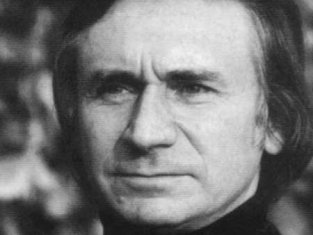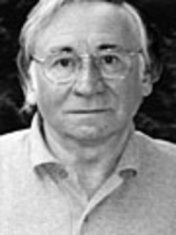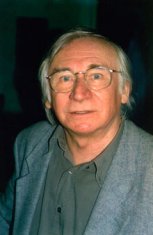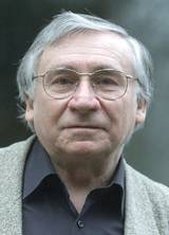|
|
Paul-Heinz Dittrich (Composer) |
|
Born: December 4, 1930 - Gornsdorf, Saxony, Germany
Died: December 28, 2020 - Berlin, Germany |
|
The German composer and teacher, Paul-Heinz Dittrich, studied composition from 1951 to 1956 at the Musikhochschule in Leipzig (diploma, 1958), and until 1958 was choral conductor of the FDGB-Ensemble in Weimar. From 1958 to 1960 he attended Rudolf Wagner-Régenyí master-classes at the Akademie der Künste in East Berlin, and until 1963 was director of the Ernst-Moritz-Arndt-Ensembles in Berlin.
From 1960 to 1976 Paul-Heinz Dittrich was assistant professor at the Hochschule fur Musik "Hanns Eisler" in East Berlin, after which he worked as a freelancer. In 1979 he became professor of composition; in 1981 Member of the Jury of the International Society for Contemporary Music. From 1983 to 1991 he taught master students at the Akademie der Künste (Berlin). In 1990 he returned the Hochschule für Musik "Hanns Eisler" in Berlin as Professor of composition. In 1991 he founded the Brandenburgische Colloquium Neue Musik in Zeuthen, of which he was chairman.
Paul-Heinz Dittrich composed orchestral works and chamber music, cantatas and Lieder. His works astutely utilize modern forms and technical idioms, while observing and preserving the pragmatic elements of instrumental and vocal writing. He takes some of his inspiration from literature, especially the poetry of Paul Celan, Sergei Yesenin, Charles Baudelaire, Novalis, Friedrich Hölderlin, T.S. Eliot and Heiner Müller. Die Kammermusiken I (with tape), III (with singing), V (with live electronics), VII, Die Blinden (with 5 speakers) and XI, Journal de poemes originated as works commissioned for the Bläservereinigung Berlin (Wind Ensemble of Berlin). Dittrich who came to oming to prominence in the 1960ís and 1970ís., is considered one of the most influential and best-known contemporary composers of serious music in Germany
In 1963 Paul-Heinz Dittrich was awarded the State Prize of the German Democratic Republic (GDR) for creative artistis. He won composition awards of cities Boswil (1972), Rome (1974), Trieste (1976) and Paris (1976). He received the Artist's Prize in 1981 and the National Prize in 1988 of the GDR. In 1983 he became a member of the Akademie der Künste in East Berlin, serving as secretary of its music section from 1990. He is also a member of the the Sächsischen Akademie der Künste, Dresden. |
|
Works |
|
Violin Sonata (1954)
Passacaglia for Orchestra (1955)
4 string quartets (1958-1959; 1982; 1987; 1991-1992)
Divel1imento for Chamber Orchestra (1959)
9 Pieces for Orchestra (1960)
Kammermusik I for Flute, Oboe, Clarinet, Bassoon, Piano, & Tape (1970); II for Oboe, Cello, Piano, & Tape (1973), III for Baritone & Wind Quintet (974), IV for Soprano, 7 Instruments & Live Electronics (1977), V for Wind Quintet & Live Electronics (1976-1977), VI for Oboe, Engish Horn, Trombone, Viola, Cello, Double Bass, Piano, & Percussion (1980), VII for 5 Speakers, Wind Quintet, & Harpsichord (985), VIIII for Oboe, Cello, & Piano (1988), IX for Flute, Clarinet, Cello, Harpsichord, Speaker, & Tape (988), X for Flute, Bass Clarinet, & Piano (989), and XI for Soprano, Cello, Piano, & Wind Quintet (1990)
Memento vitae for Baritone, 12 Vocalists, 4 Choral Groups, & Percussion (1971-1973)
Vokalblatter for Soprano & 12 Vocalists (1972-1973)
Areae Sonantes for 3 Vocal Groups & Orchestra (1972-1973)
Cello Concerto (1974-1975; Berlin, February 24, 1976)
Cantus I for Orchestra (1975; Hamburg, Deccember 20, 1977) and II for Soprano, Cello, Orchestra, Tape, & Live Electronics (1977)
Laudatio Pacis for Reciter, 4 Soloists, Chorus, & Vocal Ensemble (1975; Berlin, October 3, 1993; in collaboration with Sofia Gubaidulina and M. Kopelent)
Illuminations for Orchestra (1976; Royan, April 3, 1977)
Concel1 avec plusieurs instruments No. 1 for Harpsichord & 7 Instruments (1976), No. 2 for Viola, Cello, & 2 Orchestral Groups (1977-1978; Metz, November 18, 1978), No. 3 for Flute, Oboe, Orchestra, & Live Electronics (1978-1979; Dresden, May 31, 1979), No.4 for Piano & Orchestra (1983; Warsaw, September 25, 1984), No.5 for Flute & 7 Cellos (984), No. 6 for Oboe & Chamber Orchestra (1985; Berlin, November 15, 1991), No.7 for Oboe, Trombone, Cello, 2 Pianos, 4 Speakers, 4 Percussion, & Chamber Orchestra (1989), and No. 8 for Cello & Chamber Orchestra (1992)
Engfürung for 6 Vocalists, 6 Instrumentalists, Orchestra, Live Electronics, & Tape (Donaueschingen, October 16, 1981)
Etym for Orchestra (1981-1982; Leipzig, October 2, 1984)
Memento mari for Baritone, Double Chorus, & Percussion (1985; Stuttgart, March 15, 1988)
Spiel for 3 Speakers, 3 Singers, 11 Instrumentalists, & Live Electronics (1986-1987; Berlin, November 17, 1987)
Hymnischer Entwuif for Speaker & Orchestra (1987; Dresden, June 10, 1989)
Poesien, opera (1987-1991). |
|




|
|
Sources:
Bakerís Biographical Dictionary of 20th Century Classical Musicians (1997)
German Wikipedia Website, English translation by Aryeh Oron (August 2011)
Bits & pieces from other sources
Contributed by Aryeh Oron (August 2011, April 2021) |
|
Paul-Heinz Dittrich : Short Biography | Arrangements/Transcriptions: Works | Recordings |
|
Links to other Sites |
|
Musikarchiv: Paul-Heinz Dittrich Archiv (Akademie der Künste Berlin) [German]
Paul-Heinz Dittrich: Work List (Schirmer)
Paul-Heinz Dittrich (Wikipedia) [German]
Paul-Heinz Dittrich (Last.fm)
Paul Heinz Dittrich (WDR 3) [German] |
|
Bibliography |
| |
|
|